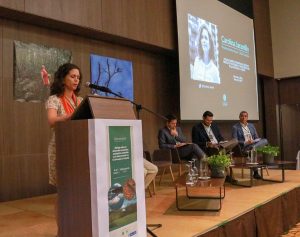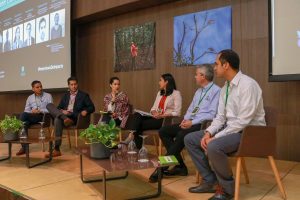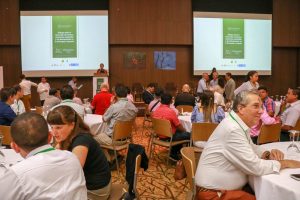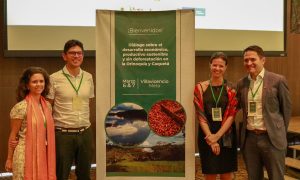
Country Representative GGGI Colombia – Carolina Jaramillo
Villavicencio, March 6 – More than 200 attendants, including government officials, producers, buyers, investors and other key stakeholders gathered in Villavicencio (Meta) to take part in the “Dialogue on sustainable productive economic development without deforestation in the Orinoquia and Caqueta regions.” This event was co-organized by GGGI and the Tropical Forest Alliance (TFA2020), with the support of the Governor’s Office of Meta, the Royal Embassy of Norway, and the Ministry of Environment and Sustainable Development. The event was aimed at promoting productive initiatives committed to deforestation-free commodities and value-chains in the regions of Caqueta and Orinoquia.

The first panel of the day focused on “Impact Investment Funds” that target investments with environmental and social impacts beyond economic returns, their role in financing these types of businesses, and how companies can access them. The panel included experts, from international and local financiers (Incofin, P4F and IFC) to one national private fund (Fondo Accion), and a private company -Kahai- that has been successful in receiving impact investment to scale up its businesses. Panelists highlighted the importance of market analysis from the planning and structuring stages of the project, thinking of scalability, the importance of traceability and transparency of good business practices, robust governance systems, and innovation as a key element to be eligible for impact financing.
A second expert panel that included representatives of IDEAM (Institute of Hydrology, Meteorology and Environmental Studies), the Rainforest Alliance and Envolvert offered insights on how to identify and monitor environmental and social impacts in sustainable productive projects that aim to be deforestation free. These tracking mechanisms are the only guarantee for the traceability of the produced commodities, assuring the chain of custody of all the social, environmental and economic benefits claimed. Tools such as the Accountability Framework, the Forestry Footprint and the National Forest Monitor System were showcased during this session, as examples on how to monitor and manage this type of information.

A third discussion among actors from the region of Meta presented the local context including the policies and ongoing public and private projects that promote a model of territorial economic development based on sustainability principles for Meta and Caqueta. These discussions provided the context for presenting the selected projects that will be supported by the Tropical Forest Alliance Implementation Dialogue.

All photos by Valentina Alvarez
All in all, GGGI’s key message to the initiatives that were presented as part of this Dialogue was that they need to be structured with a criteria of profitability, social inclusion and long-term environmental sustainability, understanding the goals of responsible buyers and investors, the markets that are evolving in a similar manner and how these changes will affect the supply chains over time. GGGI’s contribution to the region of Meta is to provide support for the initiatives and help expand funding opportunities.
Contact:
Carolina Jaramillo
GGGI Country Representative
Bogota, Colombia carolina.j@gggi.org